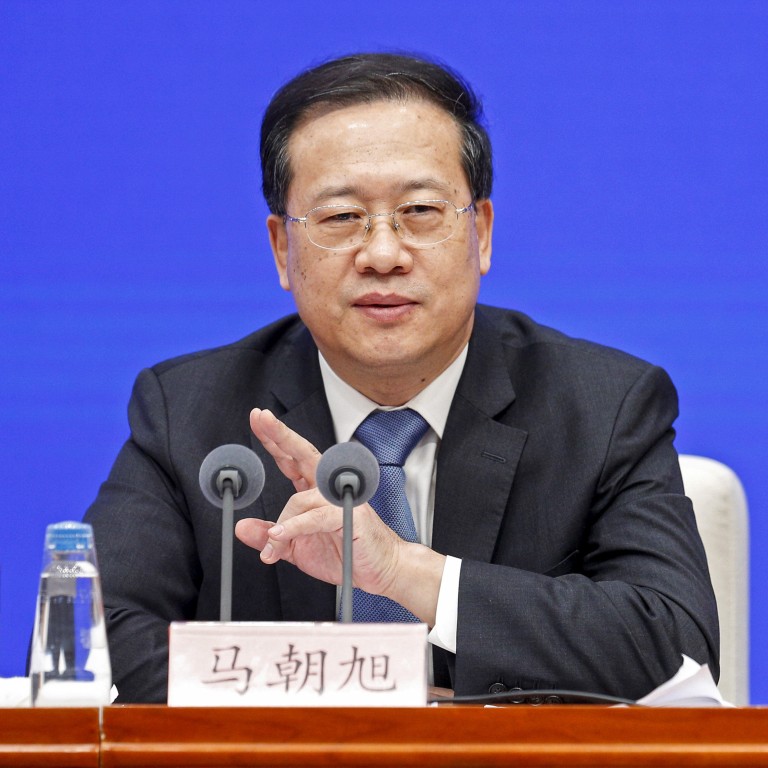
China promotes Ma Zhaoxu to top deputy for new Foreign Minister Qin Gang
- Deputy foreign minister Ma, 59, has been promoted to a full ministerial position and will oversee the daily affairs of the department
- Ex-UN envoy is noted for ‘rights with Chinese characteristics’ push and saying ‘there are no dissidents in China’ when activist Liu Xiaobo was jailed
China’s deputy foreign minister Ma Zhaoxu has been promoted to the No 3 position in the ministry, marking the latest reshuffle in the country’s diplomatic team.
The promotion will see Ma, 59, a former foreign ministry spokesman and ambassador to Australia and the United Nations, take on full ministerial duties and oversee the department’s daily affairs.
It also makes him the top deputy to Qin Gang, China’s new foreign minister.

Fellow deputy foreign minister Xie Feng, also 59 and a veteran US expert, is widely tipped to become China’s next ambassador to the United States, a role held by Qin until he became foreign minister.
Qin, 56, believed to be a trusted aide of Chinese President Xi Jinping, was named the new foreign minister on December 30. It was a surprise move from the leadership, coming just two months after Qin had won a seat on the party’s elite Central Committee.
The rise of Qin, Ma, Xie and other younger diplomats, seen as the post-Cultural Revolution generation, comes as China struggles with its most hostile external environment in decades, as ties with the US, Japan, India and the European Union continue to worsen.
But China also faces a generational gap of seasoned hands as it seeks to fend off negative perceptions and opposition to its growing assertiveness.
Ma’s new position was previously held by Le Yucheng, a career diplomat and once a leading candidate to replace Wang as foreign minister.
Le, 59, a Russian expert and a former ambassador to India and Kazakhstan, had been Wang’s top deputy in charge of the ministry’s daily affairs since March 2018. However, he failed to secure ministerial promotion.
Does this demotion signal a rethink over China’s ties with Russia?
Ma, who made his name in pushing the concept of “human rights with Chinese characteristics”, was once considered a contender for ambassador to the US as well as foreign minister but lost both races to Qin.
Ma joined the foreign service in 1987 after graduating from Peking University with a master’s degree in international economics. He shot to national fame in 1986 when he emerged as one of the best speakers at the inaugural Asian college students debating competition in Singapore.
In 1994, the ministry sent him to study at the London School of Economics and Political Science, which is famed for its role in grooming Chinese diplomats with special training programmes since the early 1970s.
After serving for a time as director of the foreign ministry’s policy planning department, Ma was named its information department chief in 2009. Two years later, he was promoted to assistant foreign minister in charge of international organisations, arms control and international economics.
In 2013, Ma was posted to Australia as China’s ambassador, and later became its UN office envoy – first in Geneva in April 2016 and then in New York in 2018. Both UN posts were vice-ministerial level jobs.
Generally viewed as a good communicator, Ma made his name during the UN postings by helping to promte Beijing’s concept of “human rights with Chinese characteristics” to counter rampant criticism over the country’s poor track record on human rights and repressive rule in Tibet and Xinjiang.
He also raised many eyebrows in February 2010, shortly after Beijing handed down a 11-year jail term to Liu Xiaobo – China’s most high-profile democracy activist and a Nobel Peace laureate who died in custody in July 2017.
Ma, then a foreign ministry spokesman, was famously quoted as asserting that: “There are no dissidents in China”.

